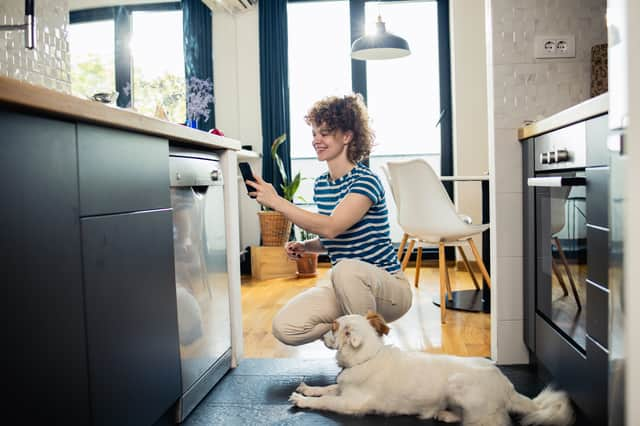Nearly a third of adults rarely register their large appliances


A survey of 2,096 adults found 60 per cent think their attitude to taking care of their machines has changed over the last couple of years, as many decide whether to try to make them last longer, or to save money and resources.
Yet nearly a third (32 per cent) say they ‘rarely’ or ‘never’ register their large products.
Advertisement
Hide AdAdvertisement
Hide AdWith an estimated 133 million fridges, washing machines and ovens homes across the UK, this could mean 42.8 million are unregistered.
And while recalls on home appliances are rare, issues with the equipment can develop over time and a simple, free in-home adjustment by a qualified engineer can ensure a longer and safer life for their items.
But, unlike our cars, a vast number of these valuable possessions are still untraceable because they are unregistered.
In response to this, the Association of Manufacturers of Domestic Appliances (AMDEA) is launching Register My Appliance Week to strongly encourage all households to take the simplest and most important act of registering their home devices to ensure their brands know where to find them.
Advertisement
Hide AdAdvertisement
Hide AdAnd whether machines are newly purchased, long installed, have been acquired ‘nearly new’ or second-hand, registration is vital to help ensure the longest possible safe lifespan.
AMDEA chief executive, Paul Hide, said: “The vast majority of appliances – new and not-so-new – can be registered easily and quickly.
“Given our growing concern that our possessions that need to last longer, working safely and efficiently, it makes sense to take care to register all our large appliances, as well as those small appliances that we’re increasingly relying on in the kitchen.
“When buying nearly new it’s also important to purchase from reputable sources, many of whom will supply a warranty.”
Advertisement
Hide AdAdvertisement
Hide AdProlonging appliance life
The results also found 29 per cent had already purchased a second-hand large appliance in the past, while 50 per cent say they would consider it in the future.
Similarly, 53 per cent purchased a small new cooking appliance in the past year, though 59 per cent still hadn’t taken the steps to register them.
When it comes to older appliances, the majority of respondents (57 per cent) are unaware that they still have time to register a machine – even if they don’t have the receipt.
As in most cases, all that’s required for registration is information about the model and serial number, and clear advice provided on the portal for where to find the vital details.
Advertisement
Hide AdAdvertisement
Hide AdThe survey probed consumers’ understanding of the terminology used to describe different types of ‘nearly new’ appliances.
Phrases such as ‘refurbished’ and ‘display model’ were well-known by 73 per cent and 72 per cent respectively, and 22 per cent said the term ‘graded’ was one they could recognise.
However, only 46 per cent knew what ‘out-of-box’ meant, and 13 per cent were left baffled by all descriptions.
ADMEA’s Register My Appliance portal provides quick and easy remedies, offering online access to more than to more than 70 leading brands, with most accepting registration of both new and older appliances.
Different manufacturer terms for ‘nearly new’ products
‘Out-of-box’/’Open box’: The product is no longer in the original or sealed box. It’s often an appliance that has been returned or used a display model. In either case they may have a small cosmetic blemish or scratch which must be disclosed.
‘Graded’: Can sometimes be called ‘B grade stock’ or ‘factory seconds’, which are brand new appliances that have been returned to the original supplier or manufacturer. There are multiple reasons for the return, but the most common is due to cosmetic damage or imperfections found on the product.
‘Refurbished’: Products that have been returned because of defections and have been fixed. Check that this has been done and tested by the manufacturer or their representative.
‘Display model’: An appliance that’s been on display, as the name suggests. It’s probably never been used but may have cosmetic blemishes and the original packaging may not be available.
Comment Guidelines
National World encourages reader discussion on our stories. User feedback, insights and back-and-forth exchanges add a rich layer of context to reporting. Please review our Community Guidelines before commenting.